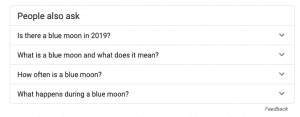- Latent: lying dormant or hidden until circumstances are suitable for development or manifestation
- Semantics: the branch of linguistics and logic concerned with meaning.
- Indexing: an indicator, sign, or measure of something
Your target consumer, “Joe,” is searching for something, let’s say “Blue Moon.” Google will pull up a list of items including a lunar occurrence, a beer brand, and a song. If your website or blog is about the history of the song, then Joe will find his answer by seeing descriptors such as Rodgers and Hart, Billie Holiday, and The Marcels. (Maybe Edward Roman—this song has a scandalous history).
In essence, Latent Semantics Indexing (LSI) is the relevance of the keywords around the keywords.
The LSI war
There are those who say that LSI is an ancient and outdated mode of thinking about SEO (it was developed in the late 1980s). At Toolbox Studios, we take our cue from Google itself and Google actually gives suggestions for latent semantics. You just need to know where to look.
Where do I look to find LSI?
Put your keyword into Google’s search bar and Google immediately begins to make suggestions in the dropdown. Jot down the relevant ones to your topic. On the search page is also this feature, “People also ask” jot down anything relevant here.
Now scroll to the bottom of the page. You’ll see “Searches related to blue moon”.
These are the most common related searches and these terms should be in your article/web page/blog, etc. Click on “blue moon song” and scroll down.
Go back up to the top and click on “Images” and you’ll see a whole row of new suggestions.
Now you are starting to gather a pretty decent list of semantically related phrases and subtopics based around your main keywords “Blue Moon” – all suggested by Google itself. There are also many SaaS tools for digging deeper into keyword research. At Toolbox Studios, we use a variety of paid tools and good old Google Analytics.
How do I incorporate these latent keywords?
Gather up your list of phrases and cross them off as you write your content. Just keep in mind, that your content is meant to be read by an actual person, so it has to make sense—just throwing a ton of semantically related keywords into paragraphs won’t be helpful to anyone. As Google’s bots are reading your content, they are seeking quality content that is genuine in offering answers that are being sought. So, use common sense, and write content that will help “Joe” in his quest for information.
Toolbox Studios can help
We strike the balance of well-curated content that includes top keywords and the semantically related keywords needed to give context to your searchability. As consumers and technology become more sophisticated, so do websites and search engines’ ability to locate pertinent information. Toolbox Studios has the expertise and personnel to manage your SEO, improve your online reputation, and write applicable content.







